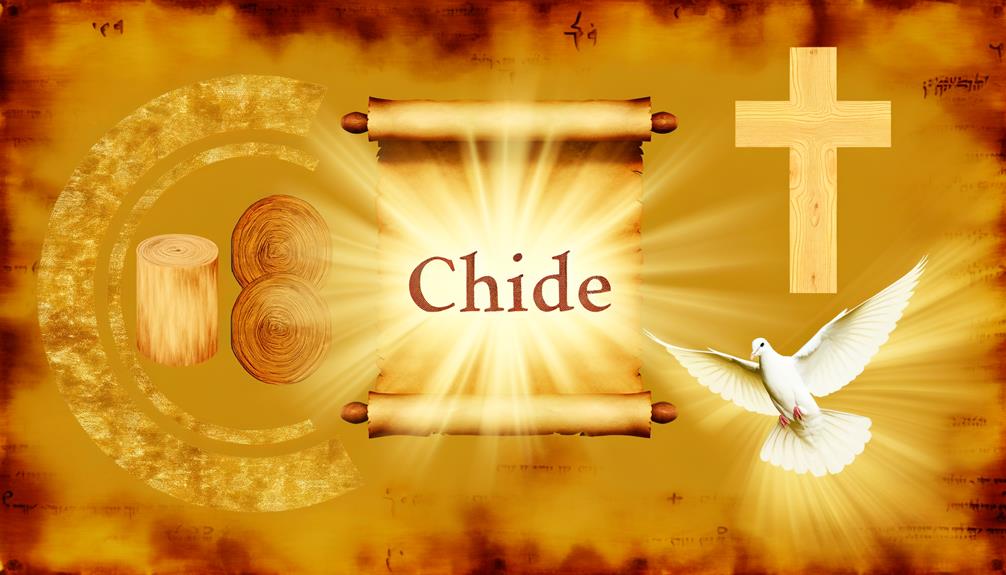Chide Meaning in the Bible: Rebuke, Correction
In the Bible, ‘chide‘ principally means to rebuke or reprimand, emerging from the Hebrew word ‘rib,’ signifying contention and dispute. It conveys God’s corrective actions towards humanity, illustrating divine displeasure and leading to moral reflection.
In the Old Scriptures, it appears in contexts of legal disputes (Deuteronomy 25:1), personal conflicts (Genesis 26:20), and divine reproof (Isaiah 3:13). Sparse yet theologically significant in the New Scriptures, it underlines the shift from Old Covenant legalism to New Covenant grace.
Understanding ‘chide’ deepens insight into God’s justice balanced with mercy and patience, fostering further exploration of divine disciplines in biblical teachings.

Chide Meaning in the Bible: Divine Correction and Loving Reproof
| Aspect | Details |
|---|---|
| Definition | To scold, rebuke, or express disapproval, often in a corrective manner |
| Key Bible Reference | Psalm 103:9 – “He will not always chide: neither will he keep his anger forever” |
| Symbolic Meaning | Divine correction, fatherly discipline, loving reproof |
| Spiritual Insight | God’s correction is not condemnation but a path toward restoration |
| Moral Lesson | Accepting reproof leads to growth, wisdom, and deeper relationship with God |
Definition of ‘Chide’

The term ‘chide,’ rooted in historical linguistics and biblical exegesis, denotes a form of reprimand or rebuke often employed to correct or admonish behavior within a theological context. Emerging from Old English ‘cīdian’ and Middle English ‘chiden,’ the word encapsulates a nuanced act of verbal correction.
In biblical literature, ‘chide’ is imbued with moral and spiritual significance, often reflecting divine displeasure towards human actions. It serves not merely as a form of human correction but as an instrument of divine pedagogy.
Theologically, ‘chiding’ is an expression of God’s righteous anger and paternal concern, aiming to guide believers back to the path of righteousness. Consequently, ‘chide’ encapsulates a profound intersection of language, morality, and divine communication.
‘Chide’ in Old Testament

In the Old scripture, the term ‘chide‘ is often translated from the Hebrew word ‘rīb,’ which carries connotations of contention or dispute.
This term is used in various contexts to signify moments of divine reprimand, as seen in passages like Exodus 17:2, where the Israelites’ quarrel with Moses underscores their lack of faith.
Analyzing these instances reveals a theological narrative that emphasizes the importance of obedience and trust in God’s providence.
Hebrew Word Analysis
Delving into the Hebrew roots, the term ‘chide’ in the Old Covenant is primarily derived from the word ‘riyb’ (רִיב), which encompasses meanings such as to endeavor, contend, or dispute, providing a multifaceted understanding of its usage in biblical texts.
This term appears in various contexts, reflecting the dynamic nature of human interactions and divine-human relationships. The following table illustrates the breadth of ‘riyb’ in the Old Scripture:
| Context | Meaning | Example Scripture |
|---|---|---|
| Legal Dispute | To contend | Deuteronomy 25:1 |
| Personal Conflict | To dispute | Genesis 26:20 |
| Divine Reproof | To rebuke | Isaiah 3:13 |
Understanding ‘riyb’ enriches our comprehension of biblical narratives and theological themes, highlighting the complexity of conflict and resolution in ancient Israelite society.
Contextual Biblical Examples
Building upon the multifaceted understanding of ‘riyb‘, the exploration of specific Old Scriptures instances where ‘chide‘ is employed reveals the intricate layers of interpersonal and divine interactions within the biblical narrative.
For instance, in Exodus 17:2, the Israelites ‘chided’ with Moses, expressing their grievances over water, highlighting human frailty and divine dependence.
Similarly, in Psalm 103:9, it is written that God ‘will not always chide,’ implying divine patience and forbearance.
These examples underscore the term’s dual application: human complaint and divine correction.
Theologically, ‘chide’ encapsulates the tension between divine authority and human agency, presenting a profound dynamic where divine patience contrasts with human impatience, therefore enriching our understanding of biblical relational paradigms.
‘Chide’ in New Testament

The New Covenant employs the term ‘chide’ sparingly, yet its usage provides profound theological and historical insights into the nature of divine correction and human relationships.
In the New Scriptures, ‘chide’ appears within contexts emphasizing the transformative power of divine love and correction over mere reprimand. This nuanced understanding reflects the shift from Old Scriptures legalism to New Scriptures grace.
Key aspects include:
- Divine Patience: Jesus’ interactions often illustrate patience over reproof, exemplifying a nurturing approach.
- Human Relationships: Early Christian teachings stress mutual edification and gentle correction, reflecting Christ’s example.
These elements collectively enrich the theological narrative of ‘chide’ in the New Scriptures.
Contextual Analysis

A thorough contextual analysis of the term ‘chide’ in biblical texts reveals its multifaceted role in illustrating the dynamics of divine-human interaction and doctrinal evolution.
Historically, ‘chide’ is used to convey God’s displeasure with human disobedience, often manifesting as a form of divine correction. For instance, in Psalm 103:9, where it is stated, ‘He will not always chide: neither will he keep his anger forever,’ the term underscores a temporary divine rebuke rather than eternal condemnation.
This nuanced usage reflects theological shifts from perpetual punishment to opportunities for repentance and restoration.
Contextually, ‘chide’ serves as a narrative and doctrinal tool, emphasizing God’s justice tempered with mercy, and thereby enriching our understanding of biblical theology and divine attributes.
Theological Implications

Examining the theological implications of the term ‘chide’ reveals its critical role in shaping our understanding of divine justice, mercy, and the nature of God’s relationship with humanity.
Historically, ‘chide’ has been used to denote God’s corrective actions towards His people, emphasizing the balance between justice and compassion.
Theologically, this term underscores several key aspects:
- Divine Patience: God’s willingness to correct rather than immediately punish.
- Moral Accountability: Humanity’s responsibility under divine law.
In essence, ‘chide’ not only reflects God’s righteous standards but also His enduring patience and commitment to guiding humanity towards righteousness.
This dual nature enriches our theological comprehension of God’s character.
Lessons for Believers

The biblical context of the term ‘chide’ reveals its significance as a form of divine reprimand, illustrating God’s corrective love towards His people, as seen in passages like Psalm 103:9.
For modern believers, this notion underscores the importance of embracing correction and self-reflection as integral aspects of spiritual growth.
Biblical Context of Chide
In exploring the biblical context of the term ‘chide,’ it becomes evident that the concept carries significant lessons for believers, particularly in understanding God’s disciplinary actions and the call for righteous living.
The term ‘chide’ is often associated with God’s rebuke of His people, highlighting His role as a divine disciplinarian. This rebuke serves not only as correction but also as a reminder of His covenantal relationship with humanity.
Biblical instances where God chides His people underscore the importance of adhering to His commandments and the consequences of straying from His path.
- Divine Discipline: God’s chiding as a form of loving correction.
- Covenantal Relationship: Reinforcement of the bond between God and believers.
Modern Application for Believers
Understanding God’s disciplinary actions through the term ‘chide’ in the biblical context provides valuable insights for modern believers, offering profound lessons on the importance of introspection, repentance, and the quest for a righteous life.
Historically, ‘chide’ signified divine correction, aiming to steer believers back to God’s path. Theologically, it underscores God’s love, emphasizing correction over condemnation. Believers today can apply these lessons by examining their lives for missteps, embracing repentance, and endeavoring for spiritual growth.
| Aspect of Chide | Biblical Context | Modern Application |
|---|---|---|
| Divine Correction | Guidance for Israelites | Personal spiritual growth |
| Love and Mercy | God’s compassionate discipline | Embracing God’s love |
| Repentance | Call for turning back to God | Continual self-examination |
| Righteous Living | Adherence to God’s commandments | Pursuit of holiness |
This approach fosters a deeper, more meaningful relationship with God.
Conclusion
In the tapestry of biblical language, the term ‘chide’ emerges as a multifaceted thread, weaving through both the Old and New Scriptures with distinct implications.
Its usage reflects moments of divine rebuke and human admonition, rich in spiritual and moral undertones.
By understanding ‘chide’ within its historical and theological context, believers gain insight into the nature of divine correction, guiding them towards a deeper, more nuanced faith journey, marked by introspection and spiritual growth.






